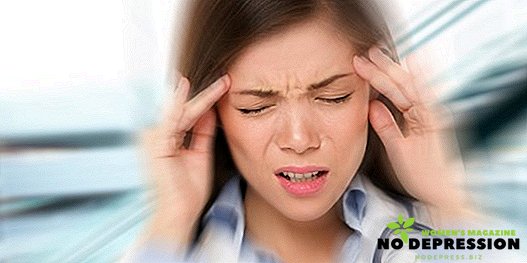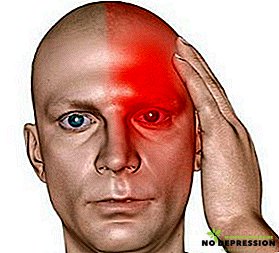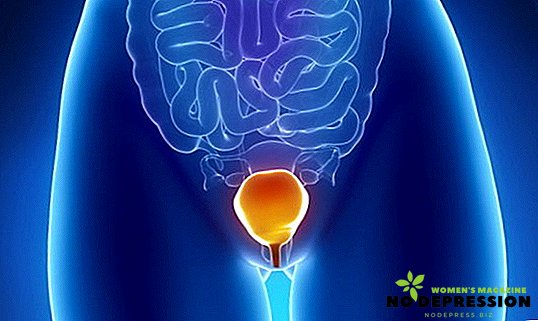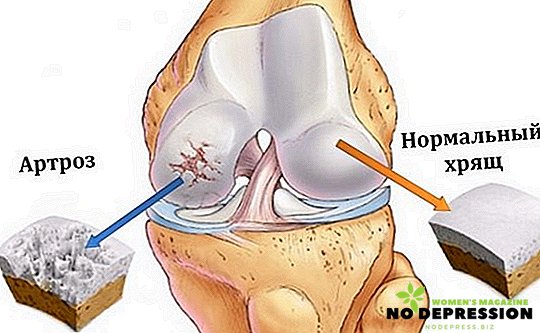Every person faces vertigo at least once in their life. This symptom of hidden diseases can occur in both a child and an undergrowth or adult. Dizziness causes disorientation, falling and possible loss of consciousness, which can cause serious injuries, especially dangerous for the elderly.
The cause of dizziness may be weakness of blood vessels, pressure surges, a sharp inflow and outflow of blood from the brain, supported by oxygen shock.

Dizziness on rising and lying down: causes
Dizziness or vertigo - a feeling when a person observes the spinning of objects around him and the loss of balance. Without support, you may fall and be seriously injured.
Vertigo when getting out of bed and when you go to bed cause various diseases.
After a sharp rise
Most often, the short-term state of vertigo in a person appears after a sharp rise from the bed in the morning. Characterized by circles in front of the eyes, darkening, tinnitus and nausea, lasts a few seconds, but can occur very often.
 The main disease causing vertigo is orthostatic hypotension, in which blood pressure drops sharply, which leads to a decrease in blood circulation in the brain. The doctor will help to understand the cause of vertigo.
The main disease causing vertigo is orthostatic hypotension, in which blood pressure drops sharply, which leads to a decrease in blood circulation in the brain. The doctor will help to understand the cause of vertigo.
Orthostatic hypotension occurs when there is a malfunction of the cardiovascular apparatus, diabetes mellitus, atherosclerosis, and the use of diuretic drugs. The treatment is carried out under the supervision of a physician.
The main recommendations of the doctor are not to carry out a sharp rise, you need to carefully take a semi-vertical posture and get out of bed in a couple of minutes. Prevention includes performing morning exercises, walking in fresh air, changing diet, and taking medications.
After taking a horizontal position
 Dizziness after taking a horizontal position is caused by diseases of the spine and neck. A change in the position of the body leads to a mixture of vertebrae in the cervical region, which leads to a decrease in blood flow to the brain.
Dizziness after taking a horizontal position is caused by diseases of the spine and neck. A change in the position of the body leads to a mixture of vertebrae in the cervical region, which leads to a decrease in blood flow to the brain.
These symptoms appear in osteochondrosis, accompanied by pain in the neck and nausea. After suffering a concussion, vertigo also appears.
A person should be alerted by dizziness after adopting a horizontal position of the body, serve as a reason for seeking medical attention.
What diseases may be hidden under dizziness
Diseases provoking vertigo:
- Hypotension. Lowering the pressure at which dizziness continues not only after lifting, but also when moving and stationary.
- Osteochondrosis of the cervical vertebrae. Characterized by crunch and pain in the neck.
- Ear stones (otoliths). Appear after 50 years in the middle ear, vertigo occurs when you turn the head in a certain direction.
- Vegetative dystonia. Manifested due to congenital weakness of the walls of blood vessels.

- Meniere's disease. It leads to temporary deafness and dizziness, without proper treatment, complete hearing loss is possible.
- Vertebral hernia. Intervertebral formations pinch the blood vessels of the circulatory system, as a result of dizziness in any position of the body.
- The inflammatory process in the inner and outer ear, nasopharynx. Tumors squeeze blood vessels, disrupting the natural blood flow that provokes vertigo.
- Migraine. Severe and throbbing pain leads to disorientation when changing the position of the body.
- Inflammations and tumors in the brain. It is possible to detect a tumor and inflammation using MRI and ECG.
- Stress, fatigue and anxiety. Cause general body fatigue, overwork and, as a result, dizziness.
- Operation, menstrual cycle, childbirth. Conditions in which blood loss occurs and pressure decreases.
Vertigo is a consequence of anemia and low hemoglobin.
The cause of dizziness is sometimes very difficult to determine, so you may need to consult several specialists: a surgeon, an ENT surgeon, a neurologist, a cardiologist, and an endocrinologist.
What to do with dizziness

Hair cells, 21,000-fold increase
If you encounter dizziness when changing your body position, you can try to cope with the problem yourself.
If this does not work, then you must always seek medical help.
The hair cells in the ears send impulses to the brain during movement.
During dizziness, these cells send a signal to the brain when the body is stationary, creating the illusion of movement.
In order to avoid dizziness, you need to follow certain rules:
- it is necessary to rise and lie down gradually, without sudden movements and jerks;
- follow your schedule of the day, relax, get enough sleep, at least 7-8 hours, make daily walks in the fresh air for at least two hours, avoid stress;
- while dieting, vertigo attacks are also possible, it is necessary to take a vitamin complex and eat foods that are high in iron, which favorably affects blood formation;
- daily exercise and therapeutic exercises.
- If you are treating inflammatory processes, you should not interrupt the course of treatment to prevent complications.
If your head is spinning in the morning, you must perform the following exercises:
- fix a glance on a single object, keep the eye on until a complete stop of vertigo;
- press a point on the forehead between the eyes with your finger and hold for 10-15 seconds;
- perform breathing exercises, slow inhale and exhale, puffing on the abdomen as you exhale and retract when inhaling;
- Massage your head, neck and face.
Drugs for treatment
In cases where ordinary activities do not bring relief and continue to manifest themselves systematically, one should resort to medical treatment and physical procedures prescribed by the doctor.
 Drug treatment includes taking antihistamines, sedatives, normalizing blood pressure, B vitamins, and myostimulants.
Drug treatment includes taking antihistamines, sedatives, normalizing blood pressure, B vitamins, and myostimulants.
Treatment of osteochondrosis occurs with the following medications: Tagista, Vazobal, Vestibo, Batarsec.
Physical procedures are also well recommended for the elimination of vertigo and related diseases. These include acupuncture, massages, reflexology and aromatherapy.
Folk remedies
Traditional medicine also has a beneficial effect on blood formation and vascular condition. To cope with the symptoms will help tincture of hawthorn, garlic, chestnut. It is also necessary to use juices: carrot, pineapple, squash juice, a mixture of beet juice, pomegranate and carrot.
 Ginger root must be dried and ground into powder, use tsp, diluted with water, three times a day. To soften the taste, you can add melissa infusion: 2 tablespoons of herbs brew and insist for 20 minutes.
Ginger root must be dried and ground into powder, use tsp, diluted with water, three times a day. To soften the taste, you can add melissa infusion: 2 tablespoons of herbs brew and insist for 20 minutes.
A mixture of juniper, camphor and fir oils in the ratio of 1: 10: 3 will help to quickly eliminate dizziness. If necessary, rubbed into the temples, lymph nodes on the head and the back of the head.
With an integrated approach to the treatment of most diseases, you can reduce the frequency of attacks of dizziness or eliminate them altogether.
On the causes of the development of vertigo in the next video will tell a neurologist.













